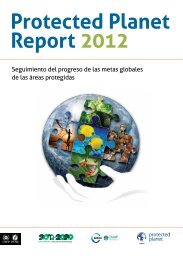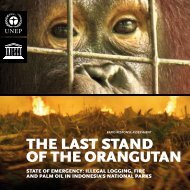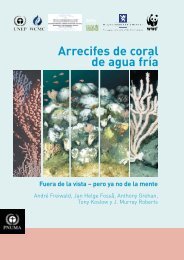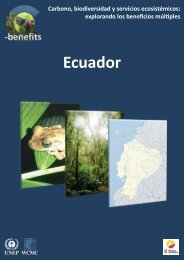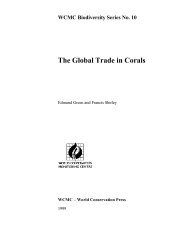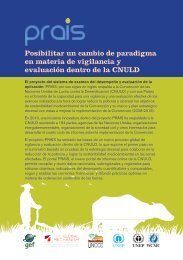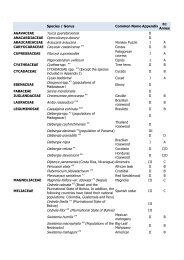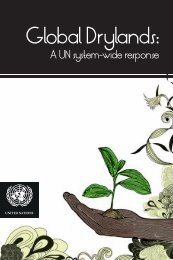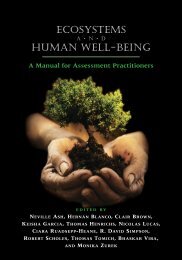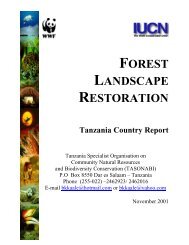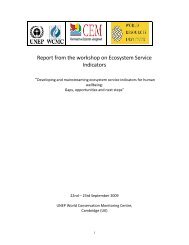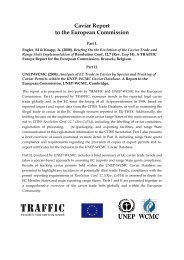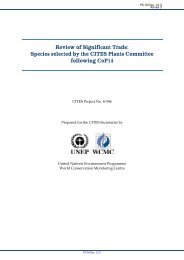2012. Review of Significant Trade - Cites
2012. Review of Significant Trade - Cites
2012. Review of Significant Trade - Cites
Create successful ePaper yourself
Turn your PDF publications into a flip-book with our unique Google optimized e-Paper software.
Tridacna spp.<br />
species Hippopus hippopus which occurs in the Solomon Islands.<br />
Management: The harvesting <strong>of</strong> wild-sourced Tridacnidae species for commercial trade was<br />
reportedly banned in the Solomon Islands under the Fisheries Regulation (1998)<br />
(Horokou et al., 2010). The Section 23 <strong>of</strong> the current Fisheries Regulation stated that “any<br />
person who has in his possession for sale, sells or buys or exports any clam meat or the<br />
product <strong>of</strong> clams <strong>of</strong> the genus Tridacna and Hippopus harvested from the wild, shall be guilty<br />
<strong>of</strong> an <strong>of</strong>fence and liable to a fine <strong>of</strong> one hundred dollars or to imprisonment for three months<br />
or to both such fine and imprisonment” (Solomon Islands Consolidated Legislation, 1996).<br />
However, it was reported that the trade and export <strong>of</strong> farmed specimens were allowed<br />
(Solomon Islands, 2009).<br />
The conservation and management <strong>of</strong> CITES-listed species in the Solomon Islands is<br />
regulated under the Wildlife Protection and Management Act (Horokou et al., 2010).<br />
T. crocea, T. derasa, T. gigas, T. maxima and T. squamosa are included in Schedule II (regulated<br />
and controlled species) <strong>of</strong> the Act, banning exports <strong>of</strong> any specimen unless with valid<br />
permits (Solomon Islands Sessional Legislation, 1998). The Act states that an attempt to<br />
export specimens for commercial purposes without a valid permit may lead to a fine <strong>of</strong> a<br />
maximum <strong>of</strong> three thousand dollars or imprisonment <strong>of</strong> a maximum <strong>of</strong> three months<br />
(Solomon Islands Sessional Legislation, 1998). Lack <strong>of</strong> capacity for implementation and<br />
enforcement <strong>of</strong> CITES, and lack <strong>of</strong> education and awareness were considered factors that<br />
limit the compliance with CITES in Solomon Islands (Kinch and Teitelbaum, 2010).<br />
Green et al. (2006) considered the lack <strong>of</strong> regulations on subsistence harvesting within<br />
Solomon Island as a possible threat to particularly T. gigas and T. derasa. However,<br />
Kinch et al. (2006) noted that there were various forms <strong>of</strong> local, traditional management <strong>of</strong><br />
Tridacnidae, including fishing restrictions in certain areas or at certain times.<br />
The giant clams have been included in the CITES <strong>Review</strong> <strong>of</strong> <strong>Significant</strong> <strong>Trade</strong> on a number<br />
<strong>of</strong> occasions. In 1995, the family Tridacnidae was included in Phase 3 <strong>of</strong> the <strong>Review</strong> <strong>of</strong><br />
<strong>Significant</strong> <strong>Trade</strong> review, following which the Solomon Islands notified the Secretariat that<br />
the export <strong>of</strong> wild-sourced specimens was prohibited, and that only exports <strong>of</strong> cultured<br />
giant clams was allowed (AC22 Inf. 12; AC 13.14.1; IUCN, 2006b).<br />
In 2004, at the 20 th meeting <strong>of</strong> the Animals Committee, all six Tridacnidae species (five<br />
species <strong>of</strong> Tridacna and one species <strong>of</strong> Hippopus) occurring in the Solomon Islands were<br />
included in the <strong>Review</strong> <strong>of</strong> <strong>Significant</strong> <strong>Trade</strong> (AC20 Summary Report). The Solomon Islands<br />
was subsequently excluded from this process at the 21 st Animals Committee meeting. At the<br />
22 nd meeting <strong>of</strong> the Animals Committee, it was noted that trade from the Solomon Islands<br />
continued to be a concern and that some sources indicated a significant decrease in<br />
aquaculture activities due to civil unrest, and CITES Parties had reported imports <strong>of</strong> wildsourced<br />
specimens (IUCN, 2006b). It was recommended that the origin <strong>of</strong> the specimens in<br />
trade should be verified (IUCN, 2006b). At the 24 th meeting <strong>of</strong> the Animals Committee, it<br />
was agreed to include Tridacna spp. from the Solomon Islands in the <strong>Review</strong> <strong>of</strong> <strong>Significant</strong><br />
<strong>Trade</strong> as an urgent case (AC24 Summary document).<br />
In 2009, representatives <strong>of</strong> Solomon Islands attended a CITES Regional Workshop that<br />
aimed to ensure the ecological, social and economic sustainability <strong>of</strong> Tridacnidae fisheries<br />
(Kinch and Teitelbaum, 2010). At the workshop, several challenges in the Pacific region were<br />
identified in the sustainable management <strong>of</strong> Tridacnidae spp., including lack <strong>of</strong> capacity for<br />
i) conducting stock assessments, ii) promoting giant clam culture, iii) enforcing harvesting<br />
regulations and iv) managing and monitoring harvests (Kinch and Teitelbaum, 2010). It was<br />
suggested that improvements in the management <strong>of</strong> Tridacnidae in the region could include<br />
strengthening legislation at the national level and producing National Giant Clam<br />
168



